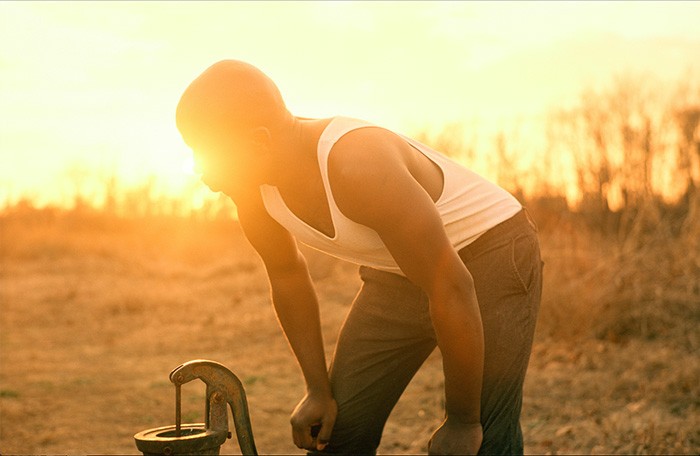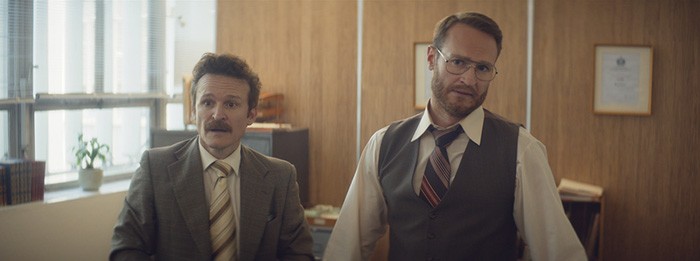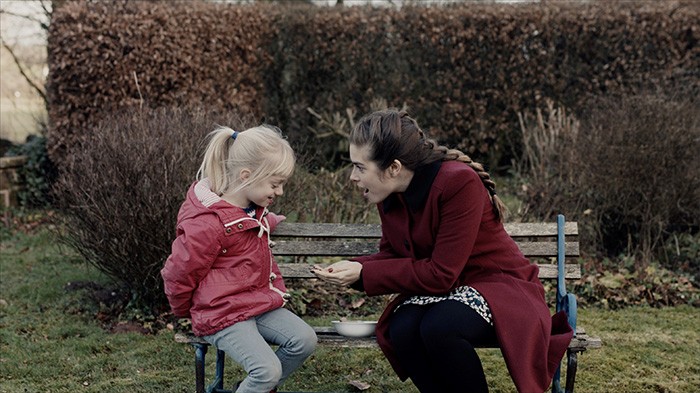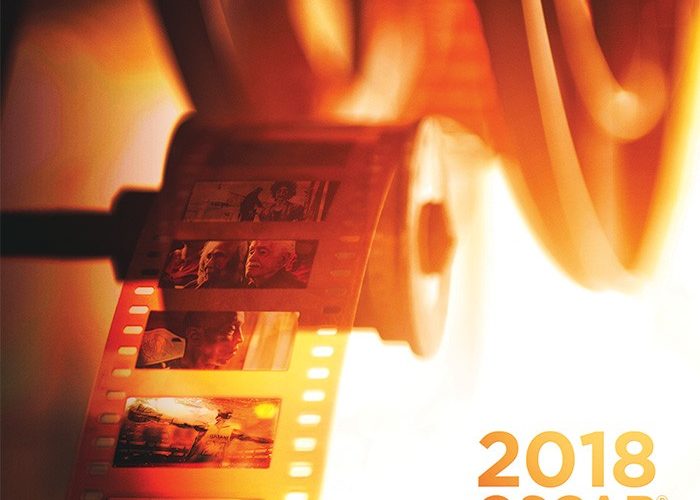Ahead of the Academy Awards, we’re reviewing each short category. See the Live Action section below and the other shorts sections here.

DeKalb Elementary – USA – 20 minutes
There’s a moment in Reed Van Dyk’s DeKalb Elementary where the young, mentally unstable white male shooter (Bo Mitchell’s Steven Hall) exits the school in search of a suicide-by-cop scenario. He opens fire on the police — receiving bullets in return — until the courageously calm black female receptionist (Tarra Riggs’ Cassandra Rice) asks him to come back in so as not to hurt himself. It’s a surreal exchange because you place yourself in her situation and realize you would probably start silently praying that the cops do grant his wish. This whole ordeal is over if they succeed at shooting him dead. The lockdown ends, the scared children in their classrooms remain safe, and another gun-toting domestic terrorist is off the street forever. But life is never so simple.
What makes these harrowing circumstances more resonant is learning that they’re based on an actual event. Van Dyk takes a real 911-call from a similar incident in Atlanta, Georgia to inspire his tale of an almost unfathomable display of human compassion. Watching Riggs’ outstanding performance is to witness the complexities behind events we’re always so quick to dismiss. Everything she does is in direct relationship to what he doesn’t do. He has the opportunity to shoot her and a co-worker, but doesn’t. He has an unsuspecting gentleman dead to rites and fires a warning shot instead. He even targets teachers in the hall but lets them lock their doors while muttering the phrase, “I don’t want the kids. I want the police.” Cassandra processes this nuance almost immediately.
She sees his internal struggle and is willing to listen as he painfully seeks help instead of taking the opportunity to be a “hero” and risk exacerbating their already precarious reality. And let’s be completely honest. Would things shake out the same if he were a black man entering a white school? Would a stereotypically suburban white woman without the intrinsic hardships someone like Cassandra has faced show the same amount of empathy for a young black man? Would she see a victim no matter the gun in his hands or would her latent racist tendencies only see a criminal? Those who think these questions are reaching reveal themselves ignorant to their privilege. Rather than sacrifice his life for hers, Cassandra hopes to save him. That’s true heroism.
Credit all involved for embracing this message of hope within dire straits and for doing so with sensitivity. DeKalb uses stereotypes (Cassandra as a black single mother barely out of difficult times and Steven as a psychologically disturbed white shooter with easy access to a gun and ammunition he has no need to possess on American soil), but he wields them with subtlety and purpose rather than exploitative means. If only we as a nation possessed the ability Cassandra and Steven have to talk and understand. If only we allowed ourselves the room to let people surprise us rather than blindly reject them as a statistic unworthy of being more than a number. If only we increased mental health accessibility and limited automatic weapons instead of the reverse.
A-

My Nephew Emmett – USA – 20 minutes
Everyone knows or should know who Emmett Till was. Many label his death as a major catalyst for what would become the Civil Rights movement — it occurring in August 1955 with the Montgomery bus boycott following in December. At only fourteen years of age this Chicago native was accused of whistling and flirting with a married white woman while visiting family in Money, Mississippi. Her husband and his half-brother tracked down where he was staying and abducted him at gunpoint during the night before leaving his lifeless body to be found in the Tallahatchie River three days later. Till’s mother insisted on a public open-casket funeral while his assailants were acquitted by an all-white jury only to admit their crime a year later thanks to double jeopardy laws.
That’s the context behind Kevin Wilson Jr.’s NYU Pre-Thesis short My Nephew Emmett, an assured, emotional look at Jim Crow Mississippi. Rather than focus on Till (Joshua Wright) himself and therefore show us the gruesome details of what we already know, Wilson turns the camera onto the man who was tasked with his wellbeing: Emmett’s preacher uncle Mose Wright (L.B. Williams). It may not sound like much, but this shift in target is huge because it shows the futility of their reality without allowing viewers the ability to dismiss their nightmare as a “misunderstanding.” To watch Emmett is to see a boy unversed in a world very different than his. His fear holds confusion while helplessness haunts Mose. Where Till still might possess hope, Mose knew the truth.
And Wilson delivers the harshness of that truth through seemingly harmless exchanges weighed down with subtext. When Mose converses with a neighborhood acquaintance about his family, it’s easy to laugh about the fish-out-of-water newcomer breathing life into those around him. But the words spoken aren’t description as much as warning. To say Emmett is funny is to explain that he’s been noticed. To say he’s a prankster is to say he might have “joked” with the wrong crowd. So when this friend describes how the boy showed a white woman how good a whistler he was, Mose can’t help but tense up. From then on the end is inevitable. All we can do is witness how it unfolds alongside him, numb to a reality that still permeates today.
The whole is very well made with effective performances centered around Williams’ memorable turn as a man who’d do anything to save his nephew’s life trapped in a position where doing so would sign the death warrant of his entire family. Wilson provides a lot with a little (see Emily Hooper as Carolyn Bryant, the “accuser”) and gets us interested in the bigger picture. I wouldn’t be surprised to learn of expansion prospects because he has a keen handle on the politics involved without letting them overshadow the tone of what is a family tragedy first and foremost. We deserve to experience historical moments like this on a micro scale to understand their universality. It’s the human cost that resonates, not its abstract significance. You could be next.
B

The Eleven O’Clock – Australia – 13 minutes
I love a good wordplay gag delivered at breakneck speed, the sort A Bit of Fry and Laurie used to deliver when Stephen Fry went rapid-fire nonsense on Hugh Laurie without a stutter, laugh, or breath. Director Derin Seale’s short film The Eleven O’Clock is a wonderful comedic scenario in that mold thanks to Josh Lawson’s shrewdly surreal script wherein a psychiatrist’s new patient believes he too is a psychiatrist. By setting the stage on a day when the real doctor’s secretary hires a temp (Jessica Wren’s Linda) to sub in for the morning, Lawson ensures we cannot know which is which. Add a slew of intentional visual and auditory clues meant to deceive in order to foster confusion and we won’t know for certain until the end.
First we meet Dr. Terry Phillips (Lawson) — a confident gentleman with an air of professionalism who is having difficulty getting into his desk drawer. Next is Dr. Nathan Klein (Damon Herriman) — a scatterbrain with blinders on who mumbles to himself as he enters the office, surprised someone is already there. The easy assumption is that the filmmakers have flipped preconceptions by making the man with poise into the patient and the jumpy one into the doctor, but what if they’re actually doing a double-switch to set-up the reversal only to deliver exactly what it appears to be on the surface? You could run in circles trying to guess, but that would only hinder your enjoyment of the quick-witted verbal war that ensues with precision timing and indefatigable hilarity.
Whether it’s the constant dismissal by one to correct the other in his wanting to be called “doctor” or a word association exercise gone awry with each round’s catalyst becoming the next round’s answer, the audience is kept perpetually on its toes. Lawson becomes the consummate straight man slowly losing patience while Herriman continuously loses his train of thought, forgetting how complicated any exchange they share will ultimately prove. Linda becomes the pickle in the middle, her own unfamiliarity with her surroundings amplifying the men’s penchant to believe they’re each the one with his name on the wall (no one checking is a plot hole worth ignoring). Between this convoluted scenario and the “psychiatrists” within (of whom we all believe are narcissists anyway), it’s impossible not to find yourself caught in the whirlwind, hanging on every word.
B+

The Silent Child – UK – 20 minutes
Director Chris Overton and writer Rachel Shenton pull no punches with their short on deaf awareness entitled The Silent Child. What could have been a cloying piece about parents thawing to the realities of a life they pretend they’re too busy to see with eyes open proves a rather bleak depiction of how ablest our society is. It’s one thing to realize how ill-equipped many institutions in the United States and Britain are towards the hearing impaired, but another to bluntly air the delusions of family members who punish their children in a false sense of self-blame. To want your deaf child to read lips is an understandable dream. But ignoring sign language as a communication tool so they feel included rather than deficient is inexcusable.
This push and pull is at the center of the film as Sue (Rachel Fielding) hires Joanne (Shenton) to help prepare her young daughter Libby (Maisie Sly) for school. The mother’s ambition is to let the girl read lips and experience school like her hearing children did. Sue’s quick to say Libby is already proficient (she’s not) and unable to comprehend how lip-reading doesn’t apply when you can’t see the lips speaking (either because she’s too forlorn and alone to look or because a teacher will still talk while facing the chalkboard). Joanne is therefore thrust into a volatile situation wherein she knows what’s best for the child isn’t what the parent wants. She hopes proof of Libby’s progress will warm Sue to this reality. We do too.
But this is a public awareness vehicle, not a fairy tale with impossible expectations. Shenton and Overton never waver from showing the change that happens to Libby when she’s seen rather than ignored. Paralleling her growth is the steady devolution into frustration of Sue as she watches the little communication she believed she shared with her daughter get usurped by something she can’t bother to learn or refuses to so her daughter isn’t saddled with a “crutch.” The filmmakers sprinkle in a couple other juicy tidbits of expository information to infer upon Sue’s psychological motivations and reinforce the stigma so many unjustly place upon deafness. While we hope Libby receives the care she deserves, we resign ourselves to the tragic statistics presented before the end credits without yet seeing them.
B

Watu Wote: All of Us – Germany/Kenya – 23 minutes
It’s dispiriting to constantly watch as Muslims are forced to defend themselves against the bigotry of Catholics who blindly reject their entire religion as one synonymous with terrorism. Looking back upon history (and the present) to see the horrors committed by Christians under the guise of “acts of God” highlights the hypocrisy and ultimately the racism at its back. They label other human beings evil for doing exactly what they have done for centuries. They champion immigration bans, quote inaccurate statistics, and sit back while an entire people is systematically eradicated simply because they pray to the same God monstrous zealots have decided to misrepresent. Too often we feign a desire for religious freedom but work tirelessly to ensure our own is ultimately the one deemed superior.
The regular citizens caught in the middle of such violent aggression are the ones who must pay. It’s their families who serve as collateral damage. It’s their tragedies so intrinsically connected to something so big as a religion that fosters the hate to keep peace at bay. But just as they are the ones who ultimately grow up with a mindset based in politicized, nationalistic rhetoric to keep the vitriol alive, they are also the only ones able to take a stand and ignore it. When a war is fought for generations, it has no end except for complete destruction. You kill us and we kill you: the cycle lives on in perpetuity until your internalized history forgets the role your people played in its creation.
So while these types of regimes brainwash their fighters into believing heroism is defined by how many “infidels” you can kill, intelligence and logic reveal true heroes as those who refuse to comply. These are the men and women Katja Benrath honors with her film Watu Wote: All of Us. Inspired by real events, Julia Drache’s script depicts a seemingly harmless thirty one-hour bus ride north towards the border between Kenya and Somalia — a place ravaged by terrorist group Al-Shabaab. One of their attacks is the reason Jua (Adelyne Wairimu) moved south, but she’s compelled to return in order to supply comfort to her ailing mother. Being a Christian victim with but one abstract target for her rage, the Muslim-majority passenger list puts her on high alert.
The film isn’t naïve about its complex subject matter, though. I’m not sure I could bestow any higher praise than saying so. The endgame will inevitably make it so Jua’s life is placed in the hands of those she so easily resents with a side-eye glare, but it doesn’t demonize her bigotry as more than an honest reactionary instinct in the process. We can’t blame her for being guarded after what we learn happened to her. But we also can’t blame Salah Farah (Abdiwali Farrah) for not wasting his time trying to change her mind when he so obviously exists in the impossible position of being a good man Christians won’t believe and a Muslim who cannot condone the actions of those giving his religion a bad name.
Their mutual caution is what binds them because society, culture, and the media have bred a mistrust that cannot be erased overnight. They also share the empathy that results from that caution. Jua snaps and feels remorse. Salah walks away, but never wavers in the true teaching of Allah about brotherhood and life. In the end it isn’t about either side because both are wrong. The act of taking up arms and allowing the mentality where killing one of your own is a worthy sacrifice to flush out one of theirs ensures that salvation doesn’t await them. No, paradise is reserved for those who recognize a person in need no matter his/her gender, sexuality, religion, or race. Heroes understand that looking like the enemy doesn’t make you one by default.
B+
The Oscar Nominated Shorts are in limited theatrical release starting February 9th. See the official site for more details and our reviews of the other shorts sections here.

